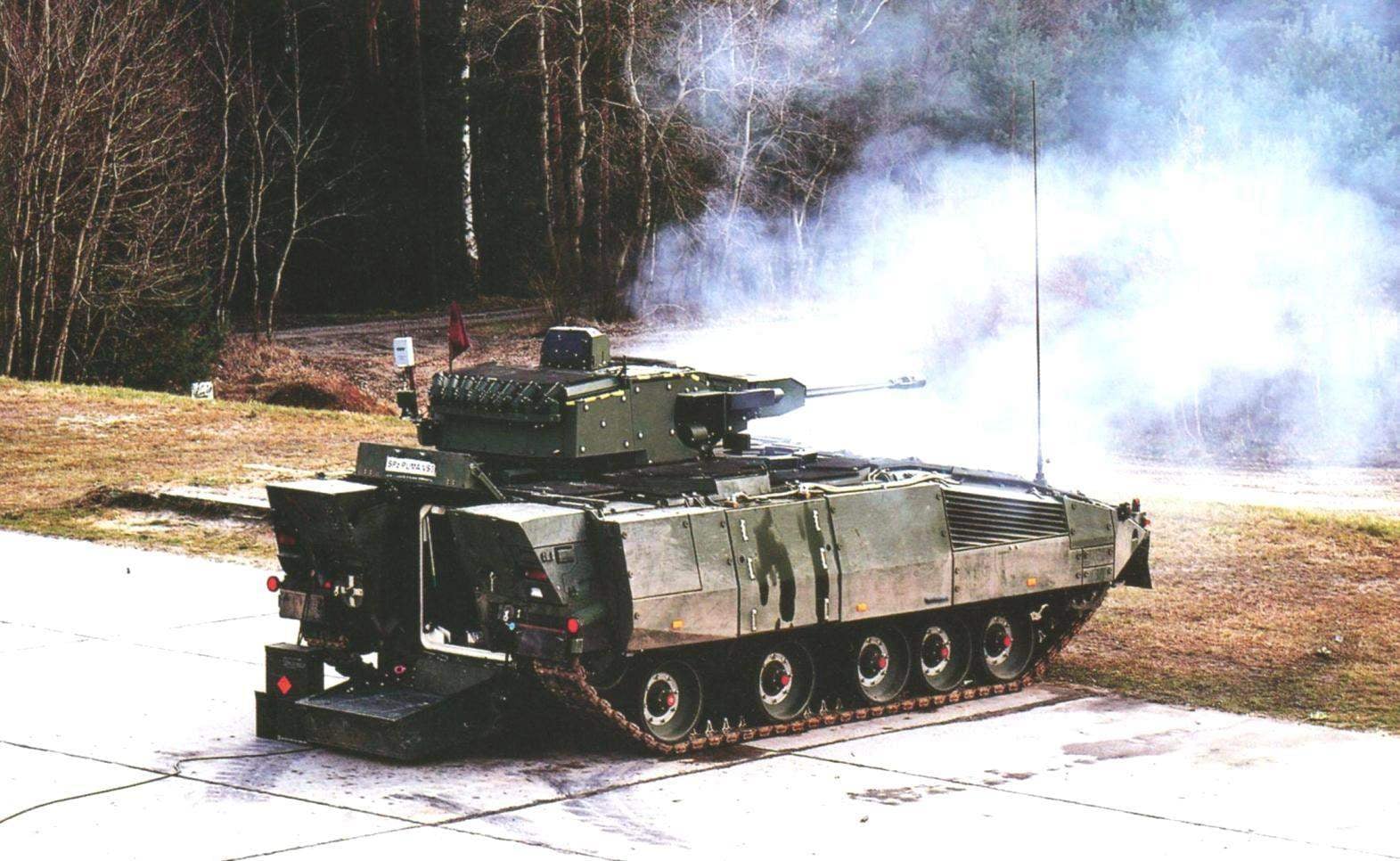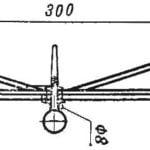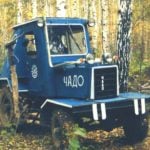 The most expensive of the latest BMP. The troops of the Bundeswehr appeared vosmiklasnica armored cars armed with 50-mm gun, which allowed them quite effectively to deal with our tanks, even the T-34. It was BA Sd.Kfz234/2. which, thanks to the firepower, maneuverability, survivability was considered the best heavy armored vehicles of the Second world war. In fact, they determined the direction of further development vosmiklasnica machines, laying the foundations of creation and the current models. In the army they gave the name “Puma”.
The most expensive of the latest BMP. The troops of the Bundeswehr appeared vosmiklasnica armored cars armed with 50-mm gun, which allowed them quite effectively to deal with our tanks, even the T-34. It was BA Sd.Kfz234/2. which, thanks to the firepower, maneuverability, survivability was considered the best heavy armored vehicles of the Second world war. In fact, they determined the direction of further development vosmiklasnica machines, laying the foundations of creation and the current models. In the army they gave the name “Puma”.
In fifty years the German designers decided to create the world’s next masterpiece, this time in the form of a tracked vehicle – infantry fighting vehicle (IFV). In 1998, the military command of Germany were given an engineering assignment considerably ahead of time. It was supposed to provide the machine and tysyacelistnik the engine and fire control system, and stable vision devices. Finally, laid as the modularity and the high level of standardization in order to create a universal tracked platform for various weapons systems. Development and production of an experimental batch of new BMP got powerful corporations KMW (Klauss-Maffei Wegmann -“Klaus-Maffei”) and RLS (Rheinmetall-Landsysteme- “Rheinmetall”).
The first prototype was assembled in may 2005 and presented to the military as the BMP “Puma”. However, this time the term or name “Puma” does not apply to the car – as compared with the careful, able to creep silently, from afar and then jump on the prey animal. It’s just a abbriviaturoy PUMA – Panzer Unter Minimalem Aufwand -“armored car for a minimum price”.
In 2004, the military leadership of the Bundeswehr, prior to the demonstration, the first sample machines, has signed with the company “Rheinmetall” a contract to build 405 units, in 2009 the contract was confirmed. Mass production and adoption of BMPs on arms of military units planned to produce in the period from 2010 to 2020.
According to the technical task of the designers was primarily to supply infantry fighting vehicles and powerful weapons to ensure its reliable fire control system. Its task was not only to combat armored targets, low-flying aircraft and helicopters, and defeat manpower, located on the fortified positions. It was proposed to use as the main weapons 30-mm automatic cannon MK 30-2/ABM “Rheinmetall”, an upgraded version of MK 30-2, positively proven in the famous infantry combat vehicles of the Austrian Ulan and Spanish “Pizarro”.

The new German infantry fighting vehicle “Puma”. The view of military experts of the prototype
By increasing the barrel length, change angle of cutting in the channel, some of the other events, the designers updated the gun was able to significantly increase muzzle velocity of shells, which undoubtedly increased its capabilities. So, for armor-piercing projectiles initial velocity was equal to 1385 m/s and effective firing range of them amounted to 2000 m. in addition, embedded on the barrel of the barrel-mounted programmer arming fragmentation shells for their remote air detonation. This enabled to deal more effectively with manpower of the enemy, even being on fortified positions, shelters. Now “killer” and range of such ammunition increased to 3000 m. Moreover, at this range it is possible to fire on armored targets, disabling the sensors, observation devices, sights.
Practical rate of fire of the gun is the one that produces reliable accuracy, 200 RDS./min At air targets shooting can be conducted with elevation angles up to +45°. Gun weight – about 200 kg
Ammunition are the standard NATO ammunition sizes 30×173 mm. feathered Armor-piercing projectiles APFSDS-T round with a tungsten core have a mass of 500 g with a mass of 2300 shots They penetrate at ranges of 1000 m armor plate thickness of 55 mm at an angle of 60°.
The shrapnel shells are ready KETF 162 cylindrical submunitions of heavy tungsten alloy with a mass of 1.24 g. blowing fuse after the expiration of the estimated time they fly toward the target, forming a narrow front cone of dispersion with the angle of 15°.
The ammunition of the gun is 400 rounds stowed in four films. Two of them, ready to fire, stowed in the ammunition box at the rear of the turret, the rest in the ammo rack in the hull of the machine.
The gun is outside the machine body in a remote-controlled tower.
Here, in the right part of the tower is 5.56 mm MG4 machine gun, the maximum range which is 1,000 m. the Ammunition 2,000 rounds is in the tapes.
To fight the enemy near the car in the rear sector to the radius of 50 meters – must use six-barreled grenade launcher SKWA caliber 76 mm with fragmentation grenades. It is located on the hull in the stern part. The fire from it is the commander of the troop compartment. For smoke-screens on the tower on both sides of units installed smoke grenades, four in each.

The tower of the BMP. Right tower-30-mm automatic cannon MK 30, followed by 5.56 mm machine gun

The internal compartments of the machine through the aft hatch. At the bottom in the picture – pubescent output ramp

A variant of the BMP “Puma”, “A”level:
1 – 30-mm automatic gun; 2 – the desert tower; 3 – the slave wheel; 4 – support roller; 5 – side armor plate; 6 – the driving wheel; 7 – the engine-transmission compartment; 8 – unit smoke grenade launchers; 9 – commander’s turret hatch; 10 – the troop compartment; 11 – driver’s hatch; 12 – unit of observation devices of the driver; 13 – the commander’s panoramic sight; 14 – gunner; 15 – stern door with ramp
This is the newest armament of the BMP “Puma” is designed for the destruction of the enemy, his armor and manpower. Note, however, that machines do not have anti-missile system, which is now considered mandatory for this kind of military equipment. Although designed their equipment complex ATGM Spike-LK-hosted dvuhruchevoj launchers on the tower. The range of this complex is 200 – 4000 m, the mass of the rocket – 13 kg, management – homing or fiber-optic lines.
Great attention developers “Puma” was given to the possibility of achieving effective fire – this car was equipped with a modern automated fire control system FCS, and implemented it in the command control system, CCS. It includes all devices designed to fire, as observation and sighting. It is primarily stabilized panoramic commander’s PERI scope with a 4x magnification, images from which are transferred to the displays of the commander and the commander of the paratroopers. The gunner raised a combined sighting WAO stable complex with day and TV channels, laser range-finder. The system includes an onboard computer interface, the information about the position of the tower, the marks of purpose, data from various sensors of the firing conditions. Installed navigation system.
In addition, the “Puma” is equipped with a system warning about laser radiation, whether the radiation from the infrared observation devices of the enemy or of the heads of rockets and shells. On the sides and stern mounted cameras, the signals from which are received on the display, thereby providing a continuous circular near-field monitoring. Present and collective protection from weapons of mass destruction and rapid fire system with pemagatshel substance DG-N is safe for humans.
Wanted the developers to increase the possibility of securing the command control BMP in the composition of army units. This was equipped with machines and even an automated system of control of troops and weapons IFIS. It ensures the flow of information control the combat units of the battalion to a single BMP, the communication and exchange of data about objects on the battlefield, the object recognition according to the principle of “friend or foe”. In addition, it is possible to control unmanned vehicles like aerial drones and ground robots.
External communications over long distances, and negotiating behind closed doors is KB-radio NRM 7400 firms Racoms, and VHF radio SEM 80/90 firm Thales. Internal communications – onboard intercom type 80/90/93.
Case “Cougars” – all-welded of steel sheets. Machine protection modular, applied levels of protection “A” and “C”.
Level “a” – aviatransporte-tion, the BMP may be transported by air on a promising military cargo plane Airbus A400M. The combat weight of the machine when it is 31.5 so At this level is provided to protect the crew when hit in the front part of the machine type cumulative grenades PG-7, feathered armor-piercing projectiles of the type 30-mm APFSDS, and protect the entire body against 14.5-mm armor-piercing bullets (such as CMP), shrapnel of artillery 155 mm high explosive projectiles, and damage underbody mines, explosive action with explosive mass of 10 kg. by the Way, the hull is made on modern technology of sheet steel with the inclusion of special protective elements. Protection BMP “And” matches IV “And” level of agreement, STANAG 4569, adopted in NATO.
BMP protection level “C” suggests an additional linkage models the armor on the sides, on the hull and on the roof. They all consist of combinations of combined and spaced armor that increases the protection of the frontal projection of the machine from the feathered piercing projectiles caliber 40 – 50 mm. Weight BMP increasing by 11.5 T.
Protection of the machine is also provided multi-functional system optical-electronic suppression (of the type complex “Blind”), which detects and recognizes anti-tank missiles and jamming their guidance systems by laser beam or radio. Soon the IFV are going to equip more and a complex of active protection type “arena”.
Difficulties to disguise the various machines on the ground to a large extent create the engine exhaust – the so-called IR signature. To reduce engine exhaust “Cougars” had largely mixed with air; the exhaust pipe is installed in the stern on the port side.

Protection modules of the BMP level “C”

BMP “Puma” level “C” modular protection. Vehicle weight is about 43 tons
Tower “Puma”, placed above the crew compartment, uninhabited, asymmetrical shapes are slightly shifted to the left side. The gun is on the right side of the tower, so her muzzle axis coincides with the diametrical plane of the machine. This, in particular, due to the fact that the Marines are in the aft troop compartment, must always be in sight of the commander of the machine. That, in turn, is placed in the body to the right, the gunner on the left. Embarkation and disembarkation both are produced through a hatch in the roof of the enclosure.
Engine-transmission compartment is located in front of the BMP, taking up almost a third of the body. Here, the left side is the driver on it – the exit hatch, the right – insulating partition, behind which is the engine room with the engine.
Weight reconnaissance vehicle “Puma”, “A” level is equal to 31,5 t, level “C” – more than 43 T. On the technical task in the project was the speed of the machine at least 70 km/h. At this weight, especially as BMP “S”, given the mobility could only be achieved by the formulation of a powerful engine. For example, to ensure acceptable performance of the tank is its power density (the ratio of engine power to the combat mass of the tank) it is desirable to have at least 20 HP/ton For infantry fighting vehicles more mobile and agile, especially as conceived, sophisticated, desirable and a lot more. Therefore, the “Puma” has put the engine capacity of 1073 L. S. In this case, the power density of the machine was very important to 34.1 HP/t for level “A”, “C”, at least to 24.9 HP/t in service with the different countries of the BMP, this ratio is significantly lower. So, for us M2A2 Bradley with a mass of 33 tons and an engine power of 500 HP – 15,15 HP/t, German A3 Marder (33,5 tons and 600 HP) persons-17.9 HP/t, slightly higher in English MCV-80 “warrior” is 23.4 HP/t at 23.5 tons, and 550 HP at the expense of reduced mass. Note that modern tanks, for example, American M1A2 “Abrams” and the German 2A5 Leopard specific power – 24,0 HP/t, Mk3 Israeli “Merkava” – 20 HP/t.
The engine on the “Puma” has put diesel 10-cylinder MTU 10V 892 HPD four-stroke turbocharged V-neck, designed by German firm MTU. Its power, recall, is equal to 1073 HP, almost twice the power of the engines, the existing BMP.
Diesel has two turbochargers, which provides five times the compression ratio of the air supplied. Has a dual-circuit liquid cooling system, equipped with electronic control systems, electrofocusing start to ensure start-up at low temperatures, the starter-generator.
Automatic transmission HSWL mounted in a single unit with the engine; it provides six speeds forward and one reverse gear. The controlled transmission having a torque Converter with lock up clutch, electrohydraulic.
The undercarriage of the vehicle – pyatikhatka on each side from the drive wheel on the front. Suspension-individual, independent, hydropneumatic.
THE SPECIFIC CAPACITY OF SOME BMP

The troop compartment is in the aft part of the BMP. It can accommodate six people in full uniform and a personal weapon. Their seats are fixed along the sides; they are made suspension to reduce the vulnerability of soldiers when possible explosions underneath the car. In the roof of the housing for entry and exit are two oval hatch and in the feed – door with a sloping ramp, having an actuator.
Such is the design of the newly established in Germany, infantry fighting vehicles, claiming the “palm” among modern armored vehicles. Indeed, the “Puma” has a very high security compared to other BMPs. Equipped with effective automatic weapons with the use of sophisticated control systems for complex munitions with remote detonation. The machine is fast, has good maneuverability.
However, a number of German military experts believe that the new IFV is too heavy and can be transported by air only in the “A” level. The transfer of the machines “With” complicated: they must be transported separately from the protection modules, and for every three modules will require additional aircraft. It turns out that, in this case, infantry fighting vehicles “C” given the level of additional costs will be comparable to a tank.
Other experts draw attention to the discrepancy between the relative small caliber 30-mm cannons and combat vehicle weight – requires stronger caliber at least 50 mm and on the need to replace 5.56 mm machine gun on the larger 7,62-mm. in addition, the BMP did not have the means to fight a well-protected armored vehicles, especially tanks.
Further, a number of critics believe obviously overestimated the height of the “Cougars” that will affect not only the possibility of disguise, but also to increase the extent of injury. So, its height is 3050 mm, while, for example, BMP M3 “Bradley” the height of the roof of the tower – 2580 mm, MCV-80 “Warrior” -2790 mm. Even a tank “Leopard 2” has a smaller height – 2790 mm.
In turn, also been affected by purely technical issues, such as unsatisfactory performance of the wireless data interface, night vision systems, a bad review from the driver, etc.
Finally, the cost. In 2012 due to budgetary constraints, the number of requested military machinery reduced from 405 to 350. It is assumed that currently the value of each unit will be approximately 7 million euros. So, “Puma” will be one of the most expensive IFV in the world. Manufacturers immediately expressed doubts that export it will not go again because of such a high cost.
On 18 October last year the Minister of defence of Germany Thomas de Mezieres in the report to the Bundestag reported that “a promising infantry fighting vehicle “Puma” until adopted by the German army and begins to enter the army in mid-2014 as previously planned”. Thus, the major project in the field of land armament of the Bundeswehr the last two decades found themselves in a situation full of uncertainty. Therefore, the title of the article posed the question: would a modern infantry fighting vehicles, created using many of the latest achievements of military equipment, but also the most expensive, adopted by the Bundeswehr?
THE PERFORMANCE CHARACTERISTICS OF THE BMP “PUMA”
Combat weight, t…………………………31,5/43,0
Crew………………………………………..3
Landing………………………………………………..6
Length of body, mm…………………………7330
Width, mm………………………3710
Height, mm…………………………………….3050
Ground clearance, mm…………………………………….450
Armor type………spaced composite/modular
Booking……………IV “And” level STANAG
Weapons………………………………..30-mm automatic cannon MK 30/2АВМ, 5.56-mm machine gun МG4, 76-mm grenade launcher-smoke grenade launchers
Sights………………………..infrared imager day/night channels and a laser rangefinder
Engine……………………10-cylinder MIT 10V 892 НРD four-stroke turbocharged V-neck; power 1073 HP
Speed km……………………………………..70
Reserve, km………………………………….600
Specific power, HP/t…………..34/25,3
V. TALANOV



